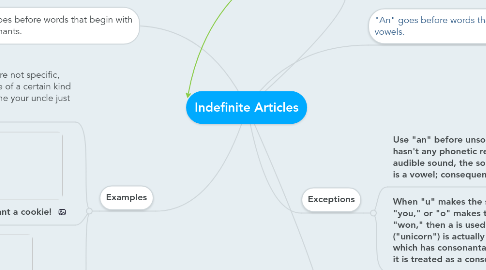Indefinite Articles
por Ángel Aguilar


1. In English, the two indefinite articles are a and an. Like other articles, indefinite articles are invariable. You use one or the other, depending on the first letter of the word following the article, for pronunciation reasons.
2. "A" goes before words that begin with consonants.
2.1. a cat a dog a purple onion a buffalo a big apple
3. Examples
3.1. We use a/an for nouns that are not specific, when we can refer to any one of a certain kind of thing. For example, imagine your uncle just made cookies. You say:
3.2. I want a cookie!
3.2.1. The word “cookie” begins with a consonant sound, so we use a. If the word begins with a vowel sound, we use an. For example:
3.3. The scientist had an idea.
3.3.1. We do not know anything about the idea, so it is not specific. The word “idea” starts with a vowel sound, so we use an.
4. The Indefinite Article Video
5. "An" goes before words that begin with vowels.
5.1. an egg an Indian an orbit an hour
6. Exceptions
6.1. Use "an" before unsounded "h." Because the "h" hasn't any phonetic representation and has no audible sound, the sound that follows the article is a vowel; consequently, "an" is used.
6.1.1. an honorable peace an honest error
6.2. When "u" makes the same sound as the "y" in "you," or "o" makes the same sound as "w" in "won," then a is used. The word-initial "y" sound ("unicorn") is actually a glide [j] phonetically, which has consonantal properties; consequently, it is treated as a consonant, requiring "a."
6.2.1. a union a united front a unicorn a used napkin a U.S. ship a one-legged man
